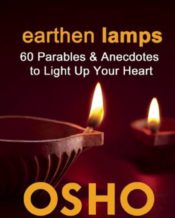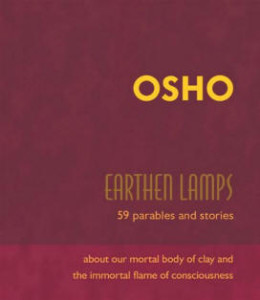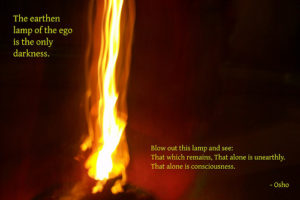About our mortal body of clay and the immortal flame of consciousness

Earthen Lamps Nederlands
Over ons sterfelijke lichaam dat stoffelijk is en de onsterfelijke vlam van bewustzijn
Dit bijzondere boek Earthen Lamps betreft de oorspronkelijke uitgave van de 59 handgeschreven parabels en verhalen van Osho uit 1967. Er worden allemaal zeer menselijke onderwerpen besproken. De ‘earthen lamp’ staat voor het lichaam dat stoffelijk is. Maar bij ieder wezen brandt daarin de vlam van het bewustzijn dat eeuwig is.
Prachtige aansprekende vertellingen, proza, maar met een zeer dichterlijke inslag waarin Osho zijn eigen bijzondere licht laat schijnen.
Met een klein lichtje kun je niet de hele weg beschijnen, maar wel dat traject wat nodig is om door te gaan.
“It is not he who thinks, but he who moves who reaches.”
Het boek Earthen Lamps is verkrijgbaar bij de Boekhandel of via internet.
Parabel 34 ‘Accepteer Jezelf’
 hen wenste te zijn. Schoonheid ligt daar waar de ontwikkeling in harmonie is met de vorm en de natuur. De mens is ongelukkig, omdat hij tegen zich zelf gericht is. Hij vecht met zijn eigen wortels en hij doet voortdurend zijn best om anders te zijn dan hij is. Het is de manier waarop hij zichzelf verliest en ook de hemel verliest die ieders geboorterecht is.”
hen wenste te zijn. Schoonheid ligt daar waar de ontwikkeling in harmonie is met de vorm en de natuur. De mens is ongelukkig, omdat hij tegen zich zelf gericht is. Hij vecht met zijn eigen wortels en hij doet voortdurend zijn best om anders te zijn dan hij is. Het is de manier waarop hij zichzelf verliest en ook de hemel verliest die ieders geboorterecht is.” Impression van Earthen Lamps
about our mortal body of clay and the immortal flame of consciousness
What a precious small book this Earthen Lamps is – a great gift item or bedside companion. It is one of the very few books that is handwritten, rather than spoken, by Osho. Each beautifully told story deals with an intensely human issue that everyone will have encountered in day-to-day life. Osho’s commentaries invite readers to “play the game of life” with more awareness and humanity the next time such a situation occurs. The medium of parables means that reading these insights is a delight, and grasping them a real possibility.
Excerpt from: Earthen Lamps, Parabel 34
“One day I was in a forest. It was rainy season and the trees were full of happiness. I told my companions: “Do you see how happy are the trees? Why? Because one has become what one actually is.”If the seed be one thing and the tree wishes to be something else, there will not be so much happiness in the forest, because the trees know nothing about the ideals; therefore, they have become what their nature desired them to be. Beauty lies where development is in keeping with the form and the nature. Man is in misery; because he is against himself. He fights with his own roots and is constantly struggling to be different from what he is. This way he loses himself and also loses the heaven which is everybody’s natural right.
told my companions: “Do you see how happy are the trees? Why? Because one has become what one actually is.”If the seed be one thing and the tree wishes to be something else, there will not be so much happiness in the forest, because the trees know nothing about the ideals; therefore, they have become what their nature desired them to be. Beauty lies where development is in keeping with the form and the nature. Man is in misery; because he is against himself. He fights with his own roots and is constantly struggling to be different from what he is. This way he loses himself and also loses the heaven which is everybody’s natural right.
Giving up all efforts to be anything except yourself
“’Friends, is it not desirable that you should wish to be what you could be? Is it not desirable that you should give up all efforts to be anything except your own self? Is it not in that desire that the mainspring of all miseries lives? What attempts could be more impossible and meaningless than the desire to be different from the self? Everyone can be only that which he can be, because it is only in the seed that the development of a tree lies. The desire to be something else can only lead to failure; failure, because how could that which is not hidden in the self from the beginning appear in the end?
But I find that every one is running the same race
Life is a manifestation of that which is covered and hidden right since the birth. Development is mere uncovering; and where the hidden does not become manifest, misery comes into being. Just as a mother will find herself in unbearable and undescribable pain she carries the child in her womb for all her life, similarly those persons find themselves in misery who do not become what they were destined to be. But I find that every one is running the same race. All of them want to what they are not and they cannot be so. What is the ultimate result? The result is that they do not become what they could have been. What he could not be, he does not become in any case;  but he is depirived of what he could have become.” Osho
but he is depirived of what he could have become.” Osho
“The earthen Lamp of the ego is the only darkness. Blow out this lamp and see: that which remains, that alone is unearthly, that alone is consciousness.” Osho
Samenvatting Earthen Lamps
One needs a very sympathetic ear and a very sympathetic heart to understand these beautiful parables, which are a rarity in Osho’s work because they don’t come from the talks that have made him so famous the parables are actually written by him. Mystics like Buddha and Jesus talked in parables and in his book Osho provides us with sixty parables, anecdotes, and stories that speak directly to us contemporary people of the modern age. These parables and their metaphors are all very simple, and because they are so simple they have a purity, they are unpolluted by complicated rationalizations of the modern mind. They are straightforward and direct, aimed to the heart like an arrow.
Osho is expressing things from the heart
In these parables Osho says in a poetic way things that cannot be said in prose. He is expressing things from the heart, things that cannot be expressed by the head. Each parable is a lesson to bring insights into one of the most important issues we face in life. As he points out, a parable is a way to talk in pictures and not in words. And in our dreams, we are again living in parables because the unconscious understands only pictures. Your conscious has become trained for language, words, but the unconscious is still that of a child. When a mystic like Osho wants to communicate something from his innermost depth to your innermost depth he uses parables. They function like a seed, hovering around the consciousness and emerging into sharp focus when our everyday life experiences bring an opportunity to apply their lessons. It is very easy to remember them.
I find that Man too is an Earthen Lamp
In the preface to this book, Osho writes: What do I find when I look deeply into man? I find that man, too, is an earthen lamp! But he is not just a lamp made of clay; in him there is also a flame of light that is constantly rising towards the sun. Only his body is made of earth, his soul is that very flame.